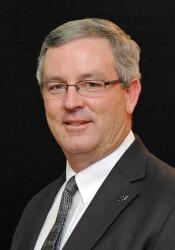Hughes Views: Things got testy on the floor last week

A
s I write this, we’ve been in full-day debate for one week, and the tone of the legislature last week was not well.
There is a lack of trust within the body, and certain members have already begun engaging in time-consuming behaviors. If this continues, late night floor debate may begin sooner than in previous years and could continue for the remainder of session.
However, we were moving through bills rather quickly before full-day floor debate started, so we are not behind. Last week actually gave everyone some time to study bills and become prepared for the coming weeks.
We are merely days away from beginning the budget process. The budget will be based on the February 2019 revenue forecast by the Nebraska Economic Forecasting Advisory Board (NEFAB) for the upcoming 2019-2021 biennium, and the forecast will be revised again in April.
In general, the revenue forecast showed a decline in the rate of growth. According to the Nebraska Legislative Fiscal office, the 37-year average general fund revenue growth is 4.8 percent, adjusted for tax rate and base changes. The projected revenue growth for the current year is 4.3 percent. For FY2019-2020 NEFAB projected growth is 4.2 percent, and for FY2020-2021 NEFAB projected growth is 3 percent.
Projected revenue growth for both of these years is lower than the current year and the historical average.
In addition, our state has immediate flooding expenses to factor in. I anticipate this budgeting process will be difficult because of all these factors. However, I am committed to pushing for property tax reform.
On a property tax note, LB483, Senator Erdman’s priority bill to change the valuation of agricultural and horticultural land, was read on general file March 20.
Senator Erdman added an amendment to it to clarify language. Unfortunately this is a very complicated bill and most of the non-farmers in the body do not understand it.
I am still not convinced the effort of changing from sales to income-based valuations will be a benefit in the long run.
Another bill regarding property tax relief was Senator Linehan’s bill, LB512, which was read on the floor last Friday. This bill would have changed provisions related to property taxes.
For example, if a person loses their house to a fire on Jan. 3, it is currently taxed at 100 percent of the valuation for the remainder of the year.
This bill would change that and give those who experience such losses relief from taxes since they would no longer be able to utilize their property.
Even though this bill was filibustered by Senator Chambers, it should eventually pass as there is broad support for it.
Tuesday Teleconference:
LB 227—Right to Farm bill
Hughes’s priority bill, LB 227—Right to Farm bill, got three hours of debate on Monday. Hughes said during Tuesday’s call that things moved faster than expected and the bill came up for debate.
Hughes said the bill got filibustered by Sen. Steve Lathrop of Omaha, who has philosophical differences with the bill.
Despite that, Hughes said they had good debate on the bill and no one got personal over the issue.
The bill would protect existing farming/livestock operations from nuisance lawsuits if later development occurs nearby.
Hughes said it’s important to protect that grandfather clause, especially if an operation wants to expand.
He said Lathrop, an attorney, wants to ensure people don’t lose their right to sue.
Debate was suspended after three hours Monday but Hughes said he has 33 senators who indicated they would vote for cloture to end debate. Just 25 votes would be needed to advance it to Select File.
Hughes would like to add a couple more insurance votes for cloture to ensure the bill doesn’t die without the needed 33 votes.
He said Lathrop can still filibuster the bill for another three hours during General File debate.
Property tax relief
The Revenue Committee continues to work on proposals for property tax relief.
He said Sen. Lou Ann Linehan, chairperson, indicated she has moderated some intense debate on the issue.
Asked if it is becoming and rural vs. urban issue, Hughes said many urban senators are getting calls from homeowners about rising property valuations.
As a result, he said urban senators are beginning to understand this just isn’t a rural issue and that school funding relies far too heavily on property taxes.
To get meaningful property tax relief, about $500 million in additional revenue would need to be raised, Hughes said.
One possibility is a 1 percent across-the-board sales tax increase, which the governor opposes.
The next issue will how to distribute school aid fairly to help offset school funding, he added.
If you would like to speak directly to me about legislative issues, join the Great Plains conference call Tuesday at 7 a.m. MT or the McCook Chamber Conference call Thursday at 7 a.m. MT. Call the office for call-in numbers.
I always enjoy hearing from the Nebraskans I represent. Please feel free to contact my office with any questions or concerns that you might have.
Read more about bills and other work of the Legislature at www.nebraskalegislature.gov. Click on the Live Video Streaming NET logo to watch sessions, hearings, and other Capitol events.
